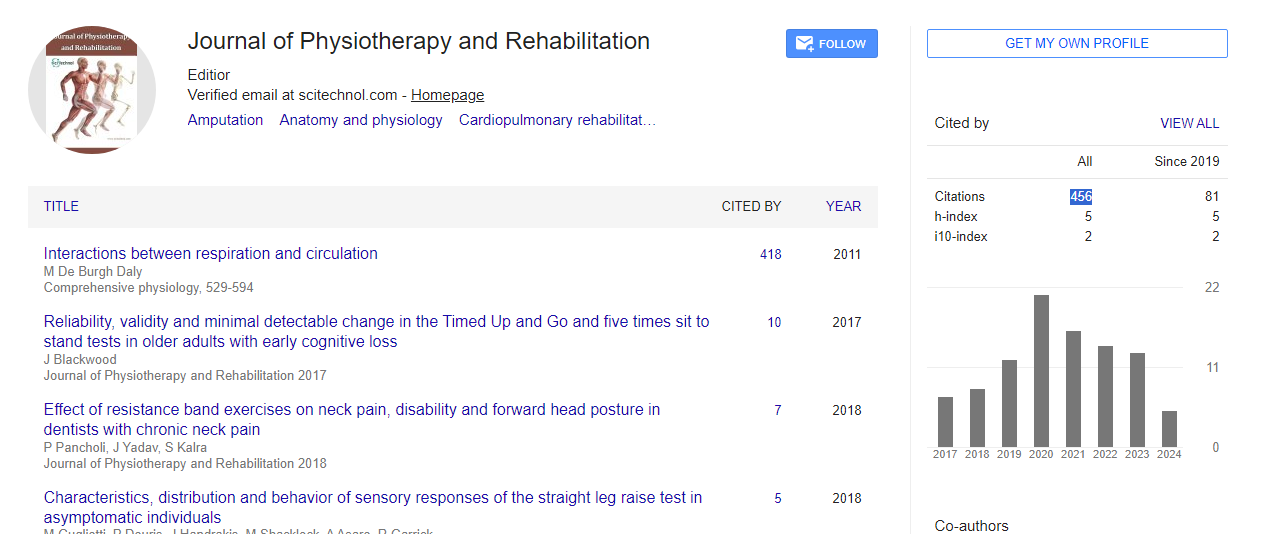Opinion Article, J Physiother Rehabi Vol: 7 Issue: 1
Dealing with Strategies and Resources for Chronic Musculoskeletal Pain
Lingxiao Wewege*
Department of Community Health Sciences, Kobe University, Graduate School of Health Sciences, Kobe, Hyogo, Japan
*Corresponding Author: Lingxiao Wewege
Department of Community Health
Sciences, Kobe University, Graduate School of Health Sciences, Kobe, Hyogo,
Japan
Tel: 7010012763
E-mail: lingwewe@phoenix.kobe-u.ac.jp
Received date: 03 February, 2023, Manuscript No. JPTR-23-91568;
Editor assigned date: 07 February, 2023, PreQC No. JPTR -23-91568 (PQ);
Reviewed date: 21 February, 2023, QC No. JPTR -23-91568;
Revised date: 28 February, 2023, Manuscript No. JPTR -23-91568 (R);
Published date: 07 March, 2023, DOI: 10.4172/JPTR.1000117
Citation: Wewege L (2023) Dealing with Strategies and Resources for Chronic Musculoskeletal Pain. J Physiother Rehabi 7:1.
Description
Chronic musculoskeletal pain is a long-lasting condition that can significantly impact a person's daily life. Coping with this type of pain requires a multidisciplinary approach that combines various strategies and resources. Some of these strategies may include medication management, stress reduction techniques, and cognitive-behavioural therapy to help manage the emotional toll of chronic pain.
Lifestyle modifications, such as adopting healthy sleep habits, eating a balanced diet, and engaging in physical activity, may also help alleviate symptoms. Support groups and peer counselling may provide additional emotional and social support, while occupational and physical therapy can help individuals maintain or regain their ability to perform activities of daily living.
It is crucial to work with healthcare providers to develop an individualized pain management plan that takes into account the unique needs and challenges of each person with chronic musculoskeletal pain. There is no single "one size fits all" approach to pain management, and a multidisciplinary team may be necessary to address the various aspects of the condition. With proper support, education, and management, it is possible to achieve a better quality of life and minimize the impact of chronic musculoskeletal pain.
Chronic Musculoskeletal Pain Strategies
Chronic musculoskeletal pain can be challenging to manage, but there are various strategies that individuals can use to improve their quality of life and minimize the impact of pain on their daily activities. Some of these strategies may include:
Medication management
relievers, such as Nonsteroidal Anti-Inflammatory Drugs (NSAIDs), acetaminophen, and opioids, can be used to manage chronic musculoskeletal pain. However, these medications have potential side effects and can be habit-forming, so it is important to work closely with a healthcare provider to determine the appropriate dosage and duration of use.
Physical therapy
Physical therapy can be an effective treatment for chronic musculoskeletal pain. A physical therapist can help individuals develop a customized exercise program to improve strength, flexibility, and mobility, which can help alleviate pain.
Lifestyle modifications
Certain lifestyle modifications, such as maintaining a healthy weight, getting enough sleep, and practicing stress reduction techniques, may help alleviate chronic musculoskeletal pain.
Complementary therapies
Complementary therapies, such as acupuncture, massage therapy, and chiropractic care, may provide additional relief for chronic musculoskeletal pain. These therapies can be used in combination with conventional treatments for optimal outcomes.
Education and support
Education and support can help individuals manage the emotional toll of chronic musculoskeletal pain. Support groups, peer counselling, and online resources can provide a sense of community and offer practical tips for coping with pain.
Mind-body techniques
Mind-body techniques, such as meditation, yoga, and deep breathing exercises, can help individuals manage chronic musculoskeletal pain by reducing stress and promoting relaxation.
Chronic Musculoskeletal Pain Resources
Managing chronic musculoskeletal pain can be challenging, but there are various resources available to help individuals cope with pain and improve their quality of life. Some of these resources may include:
Pain management clinics
Pain management clinics are specialized healthcare facilities that focus on the treatment and management of chronic pain. These clinics typically offer a multidisciplinary approach to pain management, including medication management, physical therapy, and psychological counselling.
Physical therapists
Physical therapists can provide customized exercise programs to improve strength, flexibility, and mobility, which can help alleviate chronic musculoskeletal pain.
Pain support groups
Pain support groups provide a sense of community and offer practical tips for coping with chronic pain. These groups can be found online or in-person and are often led by individuals with personal experience of chronic pain.
Online resources
There are numerous online resources available for individuals with chronic musculoskeletal pain. Websites such as the American Chronic Pain Association, the National Fibromyalgia and Chronic Pain Association, and Pain Connection offer a range of information and support for individuals with chronic pain.
Complementary therapies
Complementary therapies, such as acupuncture, massage therapy, and chiropractic care, may provide additional relief for chronic musculoskeletal pain. These therapies can be found through healthcare providers or specialized clinics.
Mind-body techniques
Mind-body techniques, such as meditation, yoga, and deep breathing exercises, can help individuals manage chronic musculoskeletal pain by pain by reducing stress and promoting relaxation. These techniques can be found through classes, online resources, or specialized clinics.
It is important to work with a healthcare provider to develop an individualized pain management plan that takes into account the unique needs and challenges of each person with chronic musculoskeletal pain. With proper management and support, individuals can improve their quality of life and minimize the impact of pain on their daily activities.
 Spanish
Spanish  Chinese
Chinese  Russian
Russian  German
German  French
French  Japanese
Japanese  Portuguese
Portuguese  Hindi
Hindi 